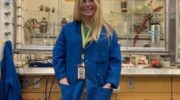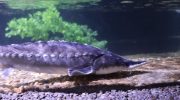DANBURY, CT – The Western Connecticut State University science outreach program “Finding Our Way” has once again received funding from the National Oceanic Atmospheric Administration (NOAA) B-Wet program. Through this funding, WCSU graduate students in the M.S. in Integrative Biological Diversity program will work with the Housatonic Valley Association (HVA) Connections Program and Danbury High School science teachers and students to learn about the history of the local watershed and restore riparian buffers along the Still River. This three-year project entails planting more than 2,000 native plants and restoring more than three-acres of habitat.
According to M.S. in Integrative Biological Diversity Program Coordinator, Dr. Theodora Pinou, “Danbury High School students should look for calls to work over the summer. We are especially interested in aquatic science students. These students would not only work with the HVA Connection Program to help restore the Still River habitat, but would gain valuable mentoring experience at the university in preparation for college or job success.” Graduate students will work with “Finding Our Way” STEM outreach resources to provide mentoring to high school students after a day of working side-by-side to restore habitat. Furthermore, WCSU faculty experts will work with Danbury Public School STEM administrators to support community outreach and professional development as teachers transition to project-based instructional pedagogy.
The M.S. in Integrative Biological Diversity Program also has received support from Praxair/Linde to fund a graduate student fellowship that will help extend the Pollinator Pathway program into Danbury’s Tarrywile Park. The student will train with Pollinator Pathway landscape designers and Highstead Foundation ecologists to expand pollinator habitat connections between open spaces identified by the Hudson to Housatonic (H2H) conservation prioritization initiative. Native seeds grown with the help of the Northeast Organic Farming Association (NOFA) Ecotype Project will assure that only locally adapted native plants will be used in the pollinator habitat plantings. As a long-time collaborator with these partners, Pinou is “thrilled to be able to bring all of them together for powerful work that can really impact human behavior and improve the environment.”
She continued, “We look forward to continuing this collaboration by increasing graduate student training fellowships and expanding this corridor work beyond Danbury. This is exactly what the graduate program is all about, ‘building on our strengths through collaboration, science and positive energy.’”
Samantha Lipscomb of Seymour, a first-year graduate student in the M.S. in Integrative Biological Diversity program, with a focus on genetic and native plant-pollinator network restoration, has been selected to work with this program. She will be trained to monitor the pollinators that visit Tarrywile Park and has plans to plant a native ecotype garden in the park. She also plans to provide educational material at the garden so the public can interact in a meaningful way and be inspired to plant native plants at home. “It’s important for people to know that they can participate in conserving Connecticut’s native species,” she said.
Of this, Lipscomb said, “This degree gives me the opportunity to research biological networks- the interactions among plants, insects, and birds. I love it all! It’s fascinating and enjoyable. This research is important and has to be continuously studied.”
The WCSU “Finding Our Way” STEM Outreach Office currently is sponsoring an Environmental Stewardship Competition for seventh graders. Applications are due by Saturday, April 25, with winners announced in June. Pinou said, “Faculty research fuels the office by providing outdoor educational stewardship experiences to undergraduates, teachers and their students, as well as families. We are currently running a stewardship competition and are seeing tremendous interest.”
According to the “Finding Our Way” website, “Environmental stewardship is the focal point of the winter/spring portion of the Finding Our Way Program. Our attention turns to devising and refining our stewardship proposals and putting them into action.” Families, teachers and schools can learn more about and enter the competition at www.wcsu.edu/stem/stewardship-project-application.
Pinou added, “These funded programs will expand efforts to educate the public about the small things they can do to help the environment and their communities and improve their environmental health. These are of extreme importance in today’s climate where people are looking for constructive ways to spend their time. These programs empower people to solve environmental challenges by revisiting their choices in how they use their open space, and highlights how their choices can help sustain biodiversity and improve the balance of nature and, in turn, our own well-being.”
To learn more about Finding Our Way, visit www.wcus.edu/stem. To learn more about WCSU’s M.S. in Integrative Biological Diversity, visit www.wcsu.edu/biology-msbiodiversity/.



